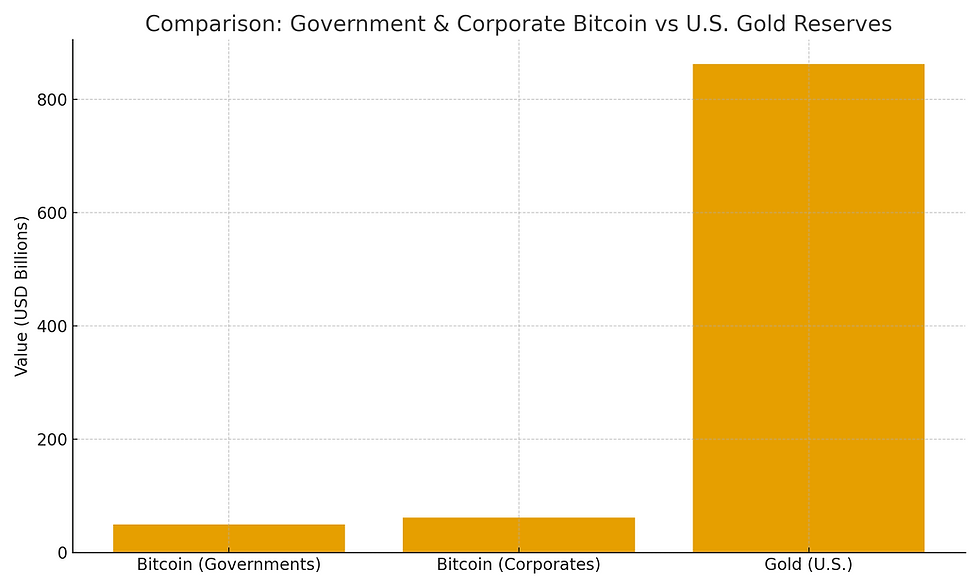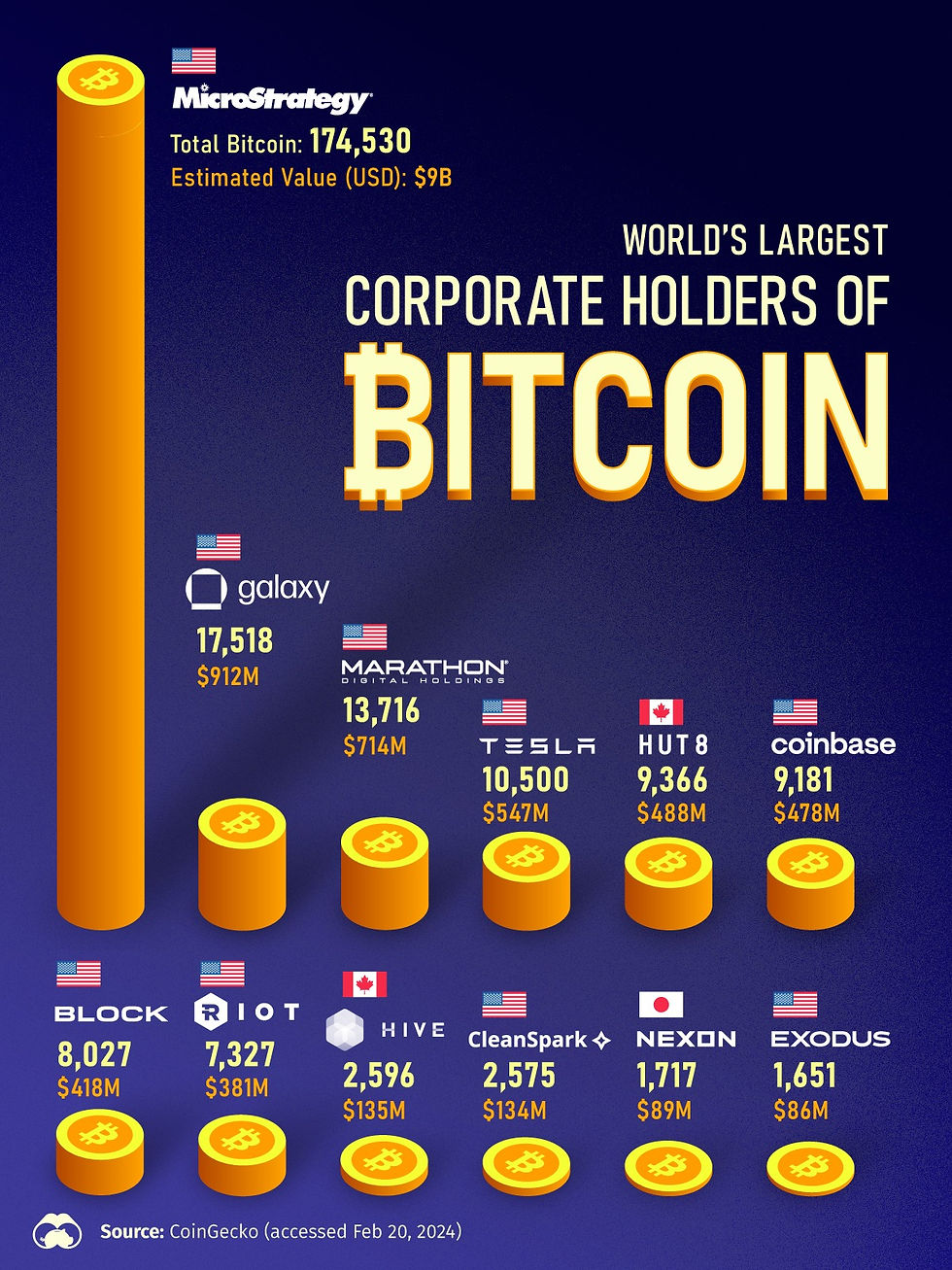When Governments Buy Bitcoin: Scarcity, Strategy, and the Smart Investor’s Guide
- Alpesh Patel
- Aug 30, 2025
- 6 min read
A World Where Governments Hoard Bitcoin
Imagine opening a government balance sheet and alongside reserves of gold and foreign currencies, you see Bitcoin. That world isn’t theoretical - it’s already here.
From the United States to Bhutan, countries are quietly amassing Bitcoin reserves worth billions. Some have mined it, others seized it, others accepted it as donations in wartime. Whatever the route, one thing is certain: sovereigns are now Bitcoin investors.

And the numbers aren’t small. Between 300,000 and 500,000 BTC—worth upwards of $50 billion - is now held by governments worldwide. That’s 2–2.5% of total supply. Add in treasuries, corporates, and ETFs, and nearly 1.5 million BTC (about 7% of supply) is effectively locked away.
This matters. Scarcity drives value. Legitimacy drives confidence. And government participation adds an entirely new dimension to Bitcoin’s story.

The Big Holders: A Data Snapshot
Here’s a quick overview of which governments hold the most Bitcoin, how much, and its estimated value:

Why This Matters for Investors
So, why should you care about what governments are doing with Bitcoin?
1. Scarcity Intensifies
Every Bitcoin governments lock away is one less in circulation. Supply is capped at 21 million, and with ETFs, corporates, and retail also piling in, scarcity is not just theoretical—it’s structural.
2. Legitimacy Boost
For years, critics dismissed Bitcoin as a fad or a Ponzi scheme. But when the U.S. creates a Strategic Bitcoin Reserve, it stops being fringe. It becomes part of a nation’s official toolkit.
3. Policy as a Market Driver
Government actions move markets. Just as central bank statements sway bond yields, sovereign Bitcoin policy could ripple through crypto prices globally.
4. Bitcoin vs Gold
Gold has long been the hedge of choice for inflation and uncertainty. Now Bitcoin is muscling in. Younger investors, digital-first economies, and sovereign reserves are treating BTC less as a gamble and more as a diversification asset.

Country Spotlights: How They’re Playing the Game
United States: Strategic Reserve, Not Speculation
In March 2025, the U.S. established its Strategic Bitcoin Reserve, funded entirely by seized BTC from law enforcement. These coins aren’t for trading - they’re being held, just like gold in Fort Knox. Some lawmakers are floating “BitBonds,” tying sovereign debt instruments to Bitcoin.
China: Silent Power
China holds ~190,000 BTC, mostly seized from scams like PlusToken. Its intentions remain unclear - whether to hold, sell, or strategically deploy. That uncertainty alone is a market risk.
United Kingdom: Law Enforcement’s Bitcoin Fortune
The UK has amassed ~61,000 BTC, largely from criminal seizures. These could influence markets if auctioned, but for now they sit dormant as sovereign assets.
Ukraine: Bitcoin in Wartime
Ukraine received ~46,000 BTC in crypto donations during its war, highlighting BTC’s real-world utility—funds that bypass traditional finance and arrive instantly.
Bhutan: The Mining Kingdom
Since 2019, Bhutan has mined Bitcoin using surplus hydroelectric power. Its stash (~11k BTC) is enormous relative to GDP, and proceeds have even been used to pay civil servant salaries.
El Salvador: The Pioneer
El Salvador made history in 2021 by adopting Bitcoin as legal tender. Its ~6k BTC holdings are modest, but symbolically huge. Recently, it improved treasury security by splitting reserves across multiple wallets with public dashboards.
Numbers That Bring It Home
Governments hold ~2.3% of all BTC in existence.
Corporates hold ~989k BTC.
Exchange balances have dropped below 15%—lowest since 2018.
Bitcoin topped $124,000 in 2025, up 20% YTD.

Corporates in Bitcoin: The Other Half of the Supply Squeeze
It isn’t just governments hoarding Bitcoin. Some of the world’s most aggressive buyers are publicly listed corporations, ranging from software firms to electric car makers and mining companies.

The standout name here is MicroStrategy, whose relentless buying spree has made it the largest corporate Bitcoin holder, with more than 174,000 BTC - a stash worth nearly $9 billion. That single company alone now owns close to 1% of all the Bitcoin in existence.
But MicroStrategy isn’t alone. Tesla famously added Bitcoin to its balance sheet in 2021, making headlines across global markets. Mining companies like Marathon Digital Holdings, Hut 8, and Riot also hold thousands of coins, not just as part of treasury strategy but as direct inventory from their mining operations. Payment and fintech players such as Block (formerly Square) and Coinbase are also significant holders.
Together, corporates collectively own nearly 1 million BTC - a figure that rivals or even exceeds government ownership. This dual dynamic - sovereign + corporate accumulation - intensifies Bitcoin’s scarcity and magnifies its role in global portfolios.

But Let’s Be Clear: Bitcoin Is Still Risky
This isn’t a pitch to gamble with your savings. Quite the opposite. I want you thinking like a hedge-funder, not a casino gambler.
Volatility Cuts Both Ways
Bitcoin can soar 30% in a month - and plunge 40% the next. If you don’t use volatility-based position sizing and stop-loss discipline, your portfolio can implode.
FOMO Is a Vote for Disaster
I’ve seen this before - dot-coms, meme stocks, tulips. Chasing hype ends badly. Bitcoin is no exception.
Regulation & Structural Risks
Governments may buy - but they can also regulate, ban, or tax. Don’t mistake current reserves as unconditional faith.
Overconfidence in Shiny Tech
Shiny isn’t always wise. Many investors chase trends tactically. Smart investors think strategically.
Could Go to Zero
I’ve said this many times: Bitcoin could, theoretically, go to zero. Unlikely, but possible. If you can’t tolerate that risk, you shouldn’t hold it.
Investor Takeaways: Portfolio Wisdom
Strategy Insight | Implication for Investors |
Sovereign Accumulation | Governments adding to reserves reduces available supply - Bitcoin scarcity may intensify. |
Policy & Sentiment Catalysts | Stay alert to reserve announcements - they herald structural demand beyond retail/institutional hoarding. |
Diversification | Bitcoin now competes with gold as an uncorrelated asset; sovereign interest gives it credibility. |
Macro Hedge Potential | With debt and inflation bubbling, Bitcoin offers a portable, digital hedge - recognized by policymakers. |
Emerging Instruments | Products like “BitBonds” could create new investable asset classes tying sovereign debt with Bitcoin exposure. |
Alpesh’s Investor Blueprint for Navigating Bitcoin
Keep It Small: 1–3% of your portfolio, max.
Discipline Rules: Use Volatility-based Stop Loss (VSL) and Position Sizing (VPS).
Don’t Cap Winners Too Early: Use stepped trailing stops; add to winners cautiously.
Be Strategic, Not Emotional: No TikTok tips, no headline chasing.
Watch Policy Moves: Sovereign decisions matter - U.S., China, Bhutan, El Salvador are market signals.
The Big Picture: From Casino to Strategy
Bitcoin isn’t a casino chip - unless you treat it like one.Governments holding it makes it more legitimate, but not risk-free.Disciplined investors can benefit from small, thoughtful exposure.Undisciplined investors will regret gambling with it.
I always tell my readers: the only person thinking about your portfolio every day is you. Don’t hand that power to hype or herd mentality. Be deliberate. Be strategic.
Final Word
Governments are in the Bitcoin game now. But that doesn’t mean you should throw your savings into crypto.
If you’re going to invest:
Keep it small.
Manage the downside.
Be strategic, not speculative.
Because investing isn’t about gambling - it’s about building wealth you can rely on. Disclaimer
This blog is for educational purposes only and does not constitute investment advice. Cryptocurrencies are highly volatile and may not be suitable for all investors. Past performance is not a reliable indicator of future returns. Always do your own research or consult a regulated financial adviser before investing. This blog is not providing personal financial advice; this article is for general educational discussion only.
Sources
Visual Capitalist, BitcoinTreasuries.net, Cointelegraph, Reuters, Statista (Government BTC data)
Alpesh Patel on trading discipline, risk management (Campaignforamillion.com, Business Insider, Trading-Champions.com)
Wikipedia & TIME (El Salvador adoption, Bhutan mining, U.S. Strategic Reserve)
Financial News London & MarketWatch (supply squeeze, BitBonds, policy effects)
Alpesh B Patel www.campaignforamillion.com








Comments